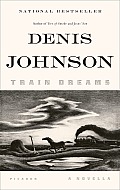1–WHY NO 2011 PULITZER FOR TRAIN DREAMS OR ANYTHING ELSE?
Train Dreams was short-listed for this year’s Pulitzer, the Pulitzer that was never awarded for reasons which will, apparently, never be explained. Michael Cunningham wrote a two-installment article in the New Yorker( http://nyr.kr/MSxOei, http://nyti.ms/PbvdqS) explaining how the jury came up with the short list, but even they were not privy to the committee’s final deliberations.
My own verdict–Johnson got shafted. I’ll start with Cunningham himself, a Pulitzer winner for his novel The Hours, which I thought was a cumbersome, pretentious mediocrity. There have been others of the same ilk from the Pulitzer folks, including last year’s Tinkers which got a big ho-hum from this corner. So, my trust level either with the committee or with Cunningham is not high.
The other two books on the short list were David Foster Wallace’s uncompleted Pale King, in progress at the time of his suicide, and Karen Russell’s Swamplandia!. I haven’t read Pale King, but judging by what I got through of Infinite Jest, I have to think it would not have been for me. However, enough people think so highly of Wallace that I’m willing to concede the fault could be with me. For Swamplandia!, no concessions.
The idea of that self-indulgent, overwritten, half-realized novel existing on the same plane as Train Dreams is absurd. Cunningham points to its exuberance and promise, both of which are evident, but a major literary prize awarded for potential? A question not to be asked. The jury read over 300 books and conferred periodically about their progress, so they can’t be faulted for effort, but the results? Yeah, there’s fault. And as for the Committee itself, well, Johnson got shafted. Period.
2–WHY TRAIN DREAMS DESERVED IT.
 Denis Johnson demonstrates not only his skill but his versatility in this exquisite gem of a novel. And how different from Tree of Smoke, which is a book of wondrous scope and full of the cadences of war. Train Dreams is a meticulous portrait in miniature of one unremarkable life lived in a limited area, and every move and emotion and sentence Johnson chooses to put on the page is precious.
Denis Johnson demonstrates not only his skill but his versatility in this exquisite gem of a novel. And how different from Tree of Smoke, which is a book of wondrous scope and full of the cadences of war. Train Dreams is a meticulous portrait in miniature of one unremarkable life lived in a limited area, and every move and emotion and sentence Johnson chooses to put on the page is precious.

Robert Granier is a man uncertain of his origins who lives in the Northwest. His education is minimal. He works in the woods. He works on the railroad. He builds a cabin, lives with his wife and child. . . and so on. I won’t detail more of the book’s action, but it proceeds in pretty much this step-by-step fashion as we follow Granier–not quite chronologically–through his life. How does Johnson keep a reader’s interest in a subject of such narrow and seemingly uninteresting substance? Like Wendell Berry, he makes each “insignificant” moment vibrate with protoplasmic intensity, reminding us that every life and every moment of every life matters. He does it by laying down sentences crafted with skill that I–and certainly Karen Russell–can only dream of.
–I got so I’m joined up too tricky to pay me, he told his boss.
–[He remembered]“the places of his hidden childhood, a vast golden wheat field, heat shimmering above a road, arms encircling him, and a woman’s voice crooning and all the mysteries of his life were answered.
–A pile as high up as a man could reach with a hoe.
–“I’m not a doctor,” he told her. “I’m just the one that’s here.”
–The dog was a big male of the far-north sledding type.
–In the dark he felt his daughter’s eyes turned on him like a cornered brute’s. It was only his thoughts tricking him, but it poured something cold down his spine. He shuddered and pulled the quilt up to his neck. All of his life Robert Grainier was able to recall this very moment on this very night.
And so on, on every delicious page.